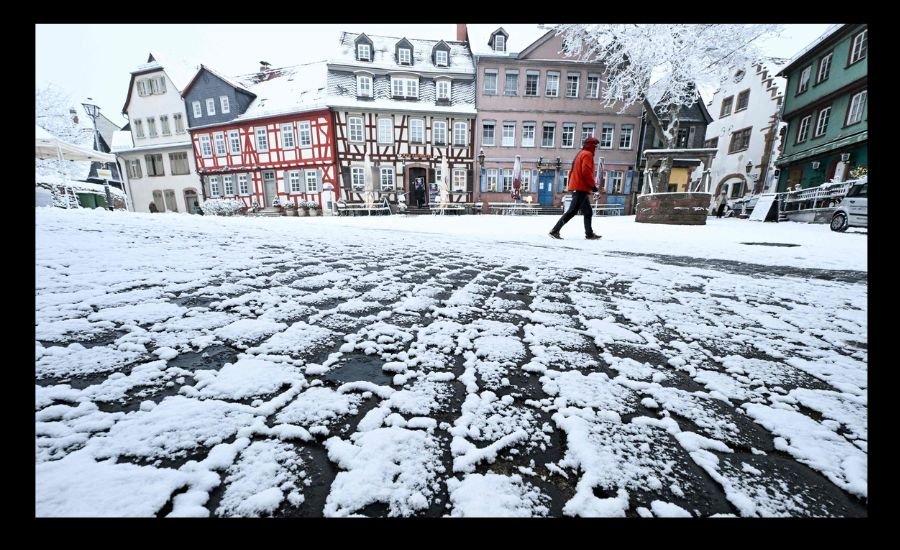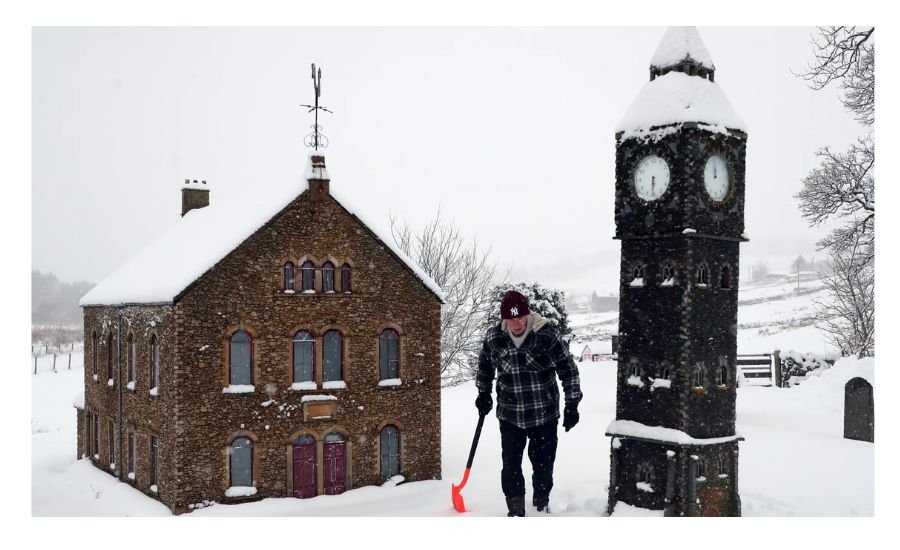Heavy snowfall causes widespread disruption in the U.K. and Germany, bringing major challenges like flight cancellations, power outages, and road closures. In this article, we’ll explore the serious impact, how authorities are responding, and what you can expect in the coming days.
When we talk about heavy snowfall, it’s not just about a layer of snow falling from the sky. The real challenge comes from the accumulated snow, freezing rain, and ice, all of which have the potential to bring cities and entire regions to a standstill. In the case of the U.K. and Germany, the snowstorms have not only affected transportation but also daily life, utility services, and even sporting events.
Heavy snowfall can disrupt daily life in several ways. First, it impacts transportation systems, making it difficult for people to get to work, school, or even travel between cities. The snow can block roads, freeze rail tracks, and cause airports to close temporarily. In both the U.K. and Germany, these issues have been seen on a large scale. In addition, freezing rain causes hazardous conditions that make it even more difficult for drivers and pedestrians to move around safely.
Second, snowfall can lead to power outages. When snow accumulates on power lines, it can cause them to collapse, leading to widespread electricity blackouts. This is a common issue during heavy snowfalls, and as seen in this recent storm, many areas, including parts of Birmingham, Bristol, and Cardiff in the U.K., have been affected by power cuts.
Lastly, businesses and public services are also impacted by snowstorms. Schools and offices are often closed, while public services such as buses and trains face delays or cancellations. With many people unable to work, it can create a sense of disruption that extends beyond just the weather itself.
The United Kingdom has been one of the hardest-hit regions by the recent snowfall. According to reports, areas in northern England are particularly vulnerable, where up to 40 centimeters (15 inches) of snow have accumulated in some places. In rural areas, there are concerns that people could be cut off from nearby towns and cities due to the snow.
One of the most significant impacts of heavy snowfall in the U.K. has been on air travel. Major airports such as Liverpool’s John Lennon Airport, Manchester Airport, and Leeds Bradford Airport were forced to close runways temporarily as snow and ice made conditions unsafe for both planes and passengers. In some cases, flights were canceled, while others were delayed for hours.
Manchester Air terminal, for occurrence, had to near its runways overnight, and in spite of the fact that it continuously returned to ordinary operations, the recuperation prepare was moderate.In the meantime, passengers were stranded, with no clear timeline for when flights would resume.
The National Grid, responsible for maintaining the U.K.’s electricity network, has been working tirelessly to restore power to affected areas. Cities such as Birmingham and Bristol, as well as Cardiff in Wales, were impacted by power cuts, leaving thousands without electricity for hours. While the restoration efforts continue, the freezing conditions have made it difficult to access and repair damaged infrastructure.
In addition to power outages, the snowstorm caused significant disruptions in the transportation sector. Many roadways were blocked, and local authorities preemptively closed some roads to avoid accidents. Even though the snow had a lasting impact, authorities continue to monitor and manage the situation.
In the world of sports, the heavy snowfall caused disruptions to various events. The Premier League football match between Liverpool and Manchester United was initially in doubt, as authorities conducted safety inspections at Liverpool’s Anfield stadium. Despite the weather conditions, the match went ahead, but several other sporting events were canceled or rescheduled due to the weather.

The heavy snowfall wasn’t just limited to the U.K. Germany too experienced its reasonable share of extreme climate, with snow and ice causing destruction in numerous regions. In the southwest, snowstorms spread quickly, leading to a variety of challenges for both residents and travelers.
Much like the U.K., Germany’s airports were severely affected by the heavy snow. Frankfurt Airport, one of Europe’s busiest, was forced to cancel 120 flights out of its scheduled 1,090 for the day. Meanwhile, Munich Airport experienced disruptions with one of its runways closed due to ice and snow buildup. Travelers faced long delays, and many flights were rescheduled, creating a domino effect of cancellations throughout the day.
In Germany, icy roads and snow-covered highways were a major problem. Authorities issued dark ice notices, encouraging drivers and people on foot to maintain a strategic distance from superfluous travel. Long-distance train services were also delayed or canceled, especially in the Frankfurt area, where the snowstorm created unsafe travel conditions for commuters.
In the town of Hemmingen in Baden-Wuerttemberg, the snow driven to a transport mishap, with eight individuals harmed when the transport slipped off the street. These types of incidents were reported throughout Germany as the snow continued to affect mobility.
If you want to read more informative contents please visit: Prime-milk
Both the U.K. and Germany have deployed resources to manage the ongoing weather crisis, though the scale of the snowfall has made it challenging to restore normalcy quickly.
In the U.K., local authorities have worked to clear roads and assist stranded motorists. However, the rural areas, particularly in the north of England, face the most difficulty, as snow accumulations are deeper, and travel is restricted. The Met Office, the country’s official weather service, has warned of continued snow and sleet in northern regions, with freezing rain expected in the south.
The National Rail system has also been disrupted, and travelers are advised to check for cancellations and delays. Emergency services have been on high alert, ensuring that those stranded or in need of assistance are helped as quickly as possible.
Germany’s government and neighborhood specialists have been issuing notices to avoid pointless travel amid the snowstormThe country’s climate benefit, the Deutscher Wetterdienst (DWD), has issued a few snow and ice warnings. On the roads, snowplows and gritters have been working around the clock to keep highways and streets clear, although accidents and delays are still common in many parts of the country.
The German Red Cross and other emergency services have also been involved in responding to accidents caused by the snow and ice. Public transport disruptions have led to delays, but efforts are ongoing to restore some semblance of normalcy.
While the current storm is causing significant disruption, both countries are bracing for more inclement weather in the coming days. Weather forecasts suggest that snow and freezing conditions will persist, with further disruptions likely. The authorities in both the U.K. and Germany will continue to monitor the situation, but travelers and residents are urged to stay informed about weather updates and follow safety guidelines.
Q: How long will the snowfall last in the U.K. and Germany?
A: The snowfall is expected to continue through the week, with heaviest snow in northern regions and milder conditions expected in the south by the middle of the week.
Q: Will there be further flight cancellations in Germany?
A: Flight cancellations are possible, especially at airports like Frankfurt and Munich, depending on the weather conditions. Travelers are exhorted to check with carriers for updates.
Q: Are there any health risks associated with heavy snowfall?
A: Yes, heavy snow and ice pose risks such as hypothermia, frostbite, and accidents due to slippery surfaces. It’s important to dress warmly and take care when traveling in such conditions.
Q: How can I stay updated on the weather in these countries?
A: You can stay informed by checking the Met Office website for the U.K. and the Deutscher Wetterdienst (DWD) site for Germany. Both services offer up-to-date weather forecasts and warnings.
Q: Is it safe to travel by train during the snowstorm in the U.K. and Germany?
A: Travel by train may be risky due to delays, cancellations, and the possibility of train tracks being blocked by snow or ice. It’s best to check the status of your train service before traveling.
The recent heavy snowfall in the U.K. and Germany has caused widespread disruption across transportation systems, power networks, and daily activities. From suspended flights to road closures and power outages, the impact has been significant. As authorities continue to manage the situation, it’s essential for residents and travelers to stay informed and take precautions. While the snowstorm is expected to continue for a while, with more snow and freezing rain on the horizon, staying safe and prepared is key to navigating this challenging weather event.
